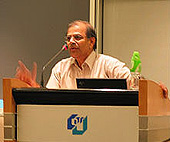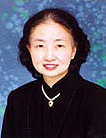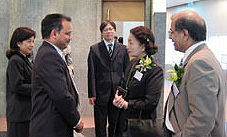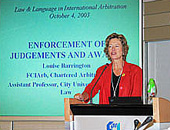Adhering to the letter of the law?
In the Opening Ceremony's warm-up remarks, Professor H K Chang, CityU's President, spoke about his time in
"
Global perspectives on an ambitious subject
Professor Dr Peter Malanczuk, Director, School of Law and WTO Law and Dispute Resolution Centre (WTODR) spoke on "Mixing Legal Cultures in International Arbitration—Lessons from the Iran-United States Claims Tribunal" in which he recounted some outstanding incidents from his experience as Legal Assistant to the President of the Tribunal from 1986 to 1989. The procedure adopted by the Tribunal provided the first large test of the United Nations Commission on International Trade Law (UNCITRAL) Arbitration Rules. The lessons learned are highly relevant to
Highlights of the Conference included presentations by: Mr Fred Kan, Senior Partner of Fred Kan & Co. (HKSAR) on "Use of Chinese in Arbitral Proceedings in Hong Kong"; Professor Candlin and Mr Paul Cheung offering a sociolinguistic perspective with "Appeals to Authority in the Enforcement of Arbitral Awards"; Professor Jan Engberg of the Aarhus School of Business (Denmark) and Professor Dorothee Heller of the University of Bergamo, CERLIS (Italy) on "Vagueness and Indeterminacy in Law"; Secretary General, Hong Kong International Arbitration Centre, Mr Christopher To, whose paper focused on the importance of preserving confidentiality in international arbitrations; Ms Kusum Dhanania, NALSAR, University of Law, Hyderabad (India) providing critical discourse analysis of arbitration proceedings in International Commercial arbitration in India; Professor Yasunobu Sato, GSID, Nagoya University (Japan) on Japan's new Arbitration Law as based in a conciliatory culture, which served to update his book, Commercial Dispute Processing and Japan; Ms Louise Barrington, Assistant Professor, CityU, speaking about "Enforcing Arbitration Awards", outlining the history of enforcement of these awards in China and noting the impact of the New York Convention; and Professor Marta Chroma, Foreign Language Department, Law School, Charles University (Czech Republic), who tackled various approaches to the translation of legal terminology.
Associate Head of the Department of English and Communication, Dr Lindsay Miller remarked, "This is a really significant conference in that it brings together so many international people, and it's a manifestation of the interdisciplinary aspect of work at universities, where legal people cooperate with linguists, who cooperate with sociologists, who cooperate with all sorts of other disciplines. Once the network's set up, mutual efforts become much easier. Professor Bhatia, an international leader in his field, has been behind it all the way."
While the topic of language and law is ambitious and relatively new to some of the Conference participants, all agreed that the event had been a great success. "It's my first time to attend an event at CityU and this proved to be a useful conference for me, as I gained insights from a European angle in addition to the Asian perspective," Professor Sato commented. "I'm interested in how the law is actually applied in dispute resolution. Because language represents culture, without addressing cultural issues, a good international dispute process is not possible, so I found the theme very relevant.
All the Conference attendees praised Professor Bhatia's hard work and superb results, who, in turn, thanked Jane Lung, a Member of the English and Communication Department's Outreach and Public Relations Committee, for her tireless assistance. "I must have heard her say 'No problem' at least 300 times," he quipped in his concluding remarks. "I am so pleased that everyone who was invited to the Conference originally planned for May and postponed due to SARS, was able to take part in one way or another. This Conference has been an opportunity to share our research and our combine our efforts. The success of the past three days spurs us on to further collaboration."The interdisciplinary LLIA Conference was jointly organized by the Department of English and Communication, the WTO Law and Dispute Resolution Centre, Hong Kong International Arbitration Centre, and the RGC-funded project, Generic Integrity in Legal Discourse in Multilingual and Multicultural Contexts.






